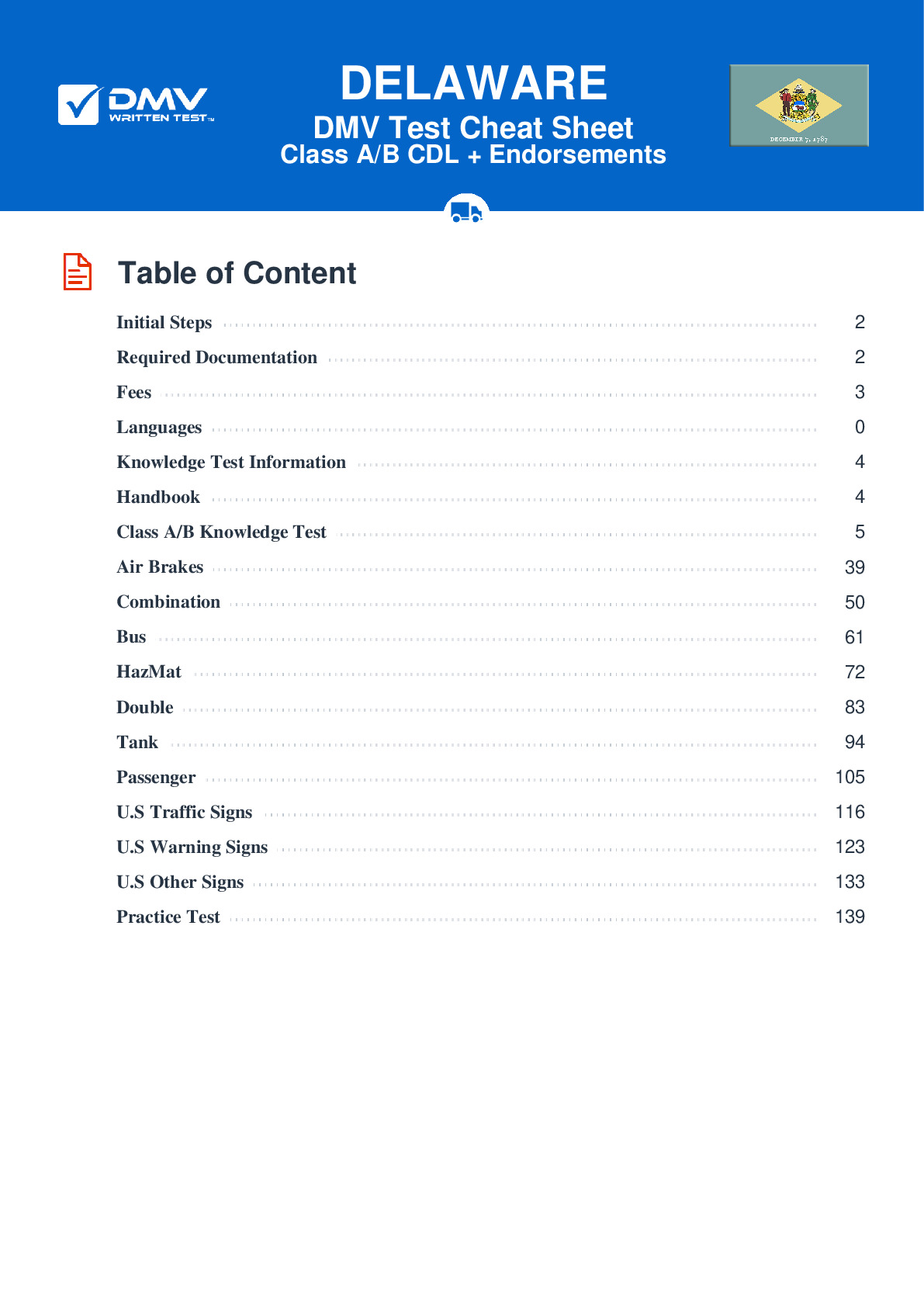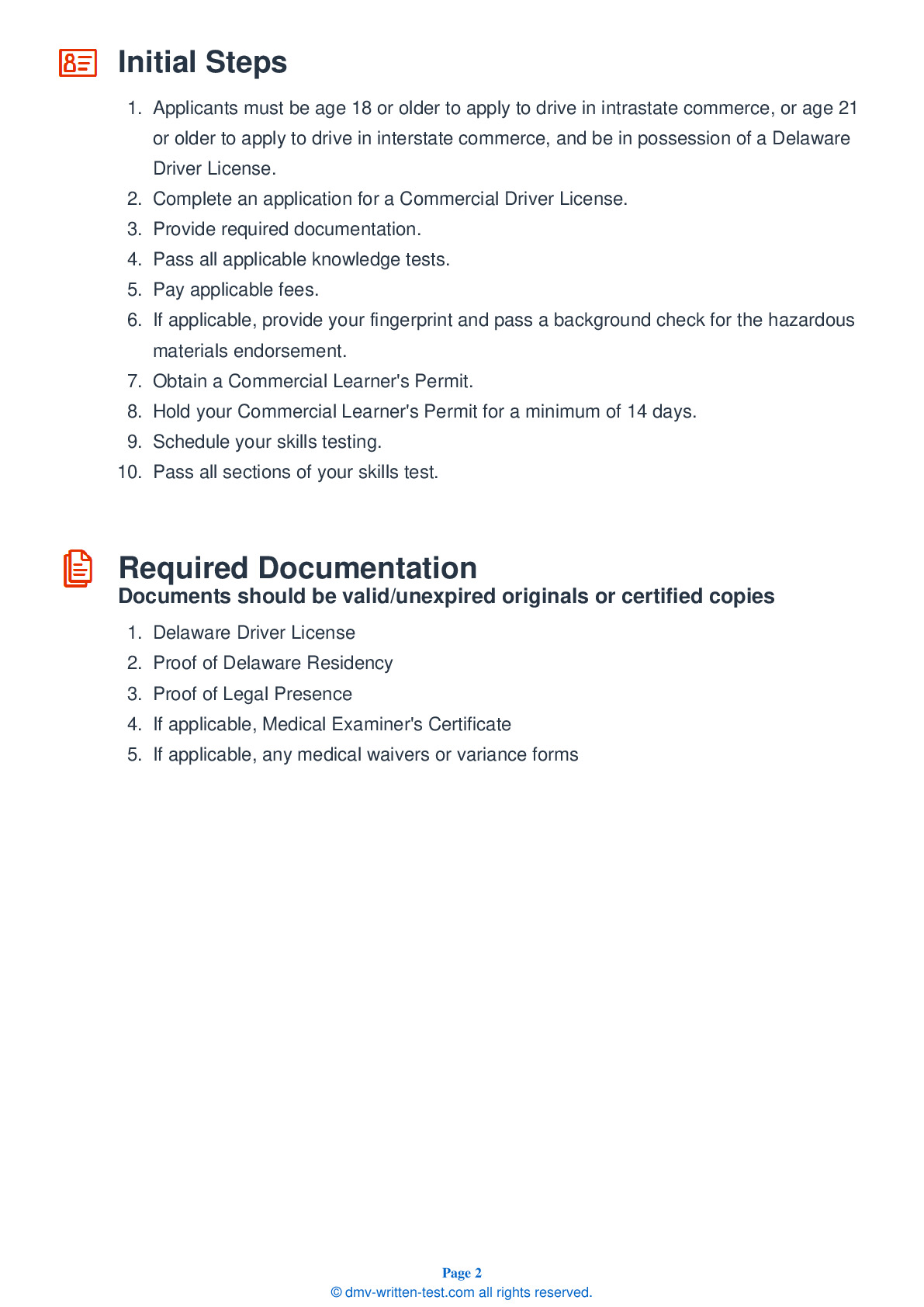Knowledge Test Class B
This license is required for driving a single vehicle with a GVWR of more than 26,001 pounds, and a trailer not to exceed 10,000 pounds gross vehicle weight rating, or a vehicle designed to transport 24 or more people (including the driver). To receive this license, applicants must pass a 50-question test. To pass, applicants must answer 40 questions correctly. Each question has three or four possible answer choices. Test questions come from the State of Delaware Commercial Driver License Manual. Questions come from chapters covering: Introduction, Driving Safely, Transporting Cargo Safely, Air Brakes (if applicable), Pre-Trip Vehicle Inspection Test, Basic Vehicle Control Skills Test and On-Road Driving.. Endorsements that may be used with a Class B CDL are: Hazardous materials, Tank, Passenger, HazMat and Tank, Air Brakes and School bus.
22. What is Gross Vehicle Weight (GVW)?
Gross Vehicle Weight (GVW) is defined as the total weight of a single vehicle in addition to its load.
23. When transporting a load, the cargo should be inspected:
Cargo and its securing devices must be inspected before starting a trip. After beginning a trip, the driver should check the load and securing devices within the first 50 miles on the road, every three hours or 150 miles traveled, and after every break.
24. When a vehicle is started, warning lights and buzzers:
After an engine is started, the warning lights and buzzers for oil, coolant, charging circuits, and the Anti-Lock Braking System (ABS) should go out right away.
25. The two indicators that determine when you should upshift are:
There are two indicators that determine when you need to shift into a higher gear. One indicator is the engine speed (rpm). You should read your vehicle's manual to learn its rpm range and shift up when you reach the top of that range. The other indicator is road speed (mph). You should learn which speeds each gear can accommodate, then keep an eye on the speedometer and shift up as needed.
26. Fuel records supporting IFTA quarterly fuel use tax returns must be kept by carriers for:
In general, if you operate a commercial vehicle in interstate commerce, it must be registered under the International Registration Plan (IRP) and International Fuel Tax Agreement (IFTA). These programs collect and distribute vehicle registration fees and fuel taxes based on what jurisdictions you drive in and for how long. Mileage and fuel records supporting IFTA quarterly fuel tax returns must be retained by carriers for four years.
27. The application pressure gauge:
In an air brake system, the application pressure gauge shows how much air pressure is being applied to the brakes. Not all vehicles with an air brake system have this gauge.
28. Which of the following is not a type of tie-down equipment?
You must use the proper number of tie-downs when securing cargo on a flatbed trailer. Examples of tie-down equipment includes ropes, straps, and chains.
Frequently Asked Questions
Here are the steps to obtain a Class B CDL in Delaware:
1. Obtain a copy of the Delaware Commercial Driver License Manual from the Delaware DMV website.
2. Meet the eligibility requirements. You must be at least 18 years old, hold a valid Delaware driver's license, and have no disqualifying criminal offenses.
3. Obtain a Medical Examiner's Certificate from a certified medical professional stating that you meet the physical qualifications to drive a commercial vehicle.
4. Complete and submit an application for a commercial driver’s license (CDL) at your local Delaware DMV office.
5. Pass the written knowledge test based on the Delaware Commercial Driver License Manual. You must score at least 80% to pass.
6. Schedule and pass a CDL skills test at an approved testing facility. The skills test consists of three parts: pre-trip inspection, basic vehicle control, and on-road driving.
7. Pay the required fees for your CDL license.
8. Upon passing all tests and meeting all requirements, you will be issued your Class B CDL license by the Delaware DMV.
1. Single vehicles with a weight rating of 26,001 pounds or more
2. Combination of vehicles with a total weight rating of 26,001 pounds or less, where the towed vehicle(s) weigh less than 10,000 pounds
3. Large buses such as city buses and tour buses
4. Straight trucks such as delivery trucks and dump trucks
5. Box trucks and flatbed trucks with attached trailers
It is important to note that some vehicle-specific endorsements may be required to operate certain types of vehicles, such as a passenger endorsement for buses or a hazardous materials endorsement for vehicles transporting hazardous materials.
1. Age: You must be at least 18 years old to operate a commercial vehicle within the state of Delaware.
2. Valid Driver's License: You must hold a valid Delaware driver's license.
3. Medical Examination: You must pass a medical examination performed by a medical professional listed on the National Registry of Certified Medical Examiners and obtain a Medical Examiner's Certificate.
4. Knowledge Test: You must pass the CDL written knowledge test for Class B vehicles, which covers topics such as vehicle inspection, basic control skills, and on-road driving.
5. Skills Test: You must pass the CDL skills test, which includes three parts: pre-trip inspection, basic vehicle control, and on-road driving.
6. Background Check: You must pass a criminal background check to ensure you have no disqualifying offenses.
7. Fees: You must pay all applicable fees for your CDL license.
It is important to note that additional endorsements may be required for specific types of vehicles or cargo, such as a passenger endorsement for buses or a hazardous materials endorsement for vehicles transporting hazardous materials.
1. Passenger Endorsement (P): If you plan on driving a bus or other vehicle designed to transport 16 or more passengers (including the driver), you will need a passenger endorsement.
2. School Bus Endorsement (S): If you plan on driving a school bus, you will need a school bus endorsement.
3. Tank Vehicle Endorsement (N): If you plan on transporting liquids or gases in bulk containers with a capacity of 1,000 gallons or more, you will need a tank vehicle endorsement.
4. Hazardous Materials Endorsement (H): If you plan on transporting hazardous materials, you will need a hazardous materials endorsement in addition to passing a security threat assessment.
It is important to note that each endorsement requires additional testing and fees beyond the standard CDL license requirements.
1. Pre-Trip Inspection: In this part of the test, you will be required to perform a thorough inspection of your vehicle to ensure that it is safe to operate. You will need to identify and explain any potential issues or safety hazards that you find.
2. Basic Vehicle Control: In this part of the test, you will be asked to demonstrate your ability to control your vehicle in various driving situations, such as backing up, turning, and parking.
3. On-Road Driving: In this part of the test, you will need to demonstrate your ability to safely operate your vehicle on public roads. You will need to follow all traffic laws and signals, merge onto highways, change lanes, and navigate through intersections.
During the skills test, you will be evaluated on your ability to operate the commercial vehicle safely and effectively. You must pass all three parts of the test in order to obtain your Class B CDL license.
1. Vehicle Type: Drivers with a Class B CDL are only authorized to operate single-unit vehicles with a gross vehicle weight rating (GVWR) of 26,001 pounds or more. They are not authorized to operate combination vehicles, which require a Class A CDL.
2. Passenger Limitations: Drivers with a Class B CDL may only transport up to 16 passengers (including the driver) in a single vehicle.
3. Hazardous Materials: Drivers with a Class B CDL may transport hazardous materials, but only if they have the appropriate endorsements on their license and have undergone the required security threat assessment.
4. Medical Requirements: All commercial drivers, including those with a Class B CDL, must meet certain medical requirements to maintain their license.
It is important to note that these restrictions and limitations may vary by state and may be subject to change. It is the responsibility of the driver to know and adhere to all regulations related to their license class.
However, it is important to note that the skills test (which includes the pre-trip inspection, basic vehicle control, and on-road driving) must be taken in English. This is because English is the standard language of communication between commercial drivers and law enforcement officers, as well as other truck drivers on the road.
If you need to take the written test in a language other than English, you should contact your local DMV office to confirm which languages are available and to schedule your appointment. You may need to bring a translator with you if you need assistance understanding the test questions or instructions.
To request accommodations, you will need to complete the DMV's Request for Accommodations form and provide documentation of your disability from a qualified healthcare professional. The documentation should include a diagnosis of your condition, a description of how it affects your ability to take the test, and any recommended accommodations or modifications that would help you take the test.
Examples of accommodations that may be available include extended time on the test, a separate testing room, or the use of assistive technology such as a screen reader or magnifier. The DMV will review your request and work with you to determine which accommodations are appropriate and available.
It is important to note that requests for accommodations should be made as early as possible to allow time for review and implementation. You should contact your local DMV office for more information on how to request accommodations for the Class B CDL written test.
If you fail the test three times, you will need to wait six months before you can take the test again. During this time, it is recommended that you review the CDL manual and study the areas where you had difficulty answering questions.
It is important to note that there is a fee for each attempt at the written test. The fee for the Class B CDL written test in Delaware is $40.
If you pass the written test, you will be eligible to take the skills test which includes the pre-trip inspection, basic vehicle control, and on-road driving. Passing both tests is required to obtain a Class B CDL.
If you have any questions or concerns about retaking the Class B CDL written test in Delaware, you should contact your local DMV office for more information.




